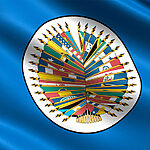Case Update: Rodriguez et al v Pan-American Health Organization
US Court of Appeals, District of Columbia Circuit, No. 20-7714
In the wake of Jam v International Finance Corporation (Jam), the appeal in Rodriguez offered US courts an unparalleled opportunity to achieve greater clarity in relation to the scope and interpretation of IO immunities.
Summary of Facts
Rodriguez involved a class-action suit by a group of Cuban doctors against the Pan American Health Organization (PAHO), an IO headquartered in Washington, D.C. which promotes health initiatives in the Americas. The doctors sued PAHO for its facilitative role in the Mais Médicos (“More Doctors”) program, under which 6000 internal medicine specialists were coerced by the Cuban government to provide medical services to impoverished people in Brazil. This allegedly occurred without the physicians’ consent and in violation of human trafficking laws.
By bringing this claim, the doctors sought to achieve “justice” for all physicians who had similar experiences at the hands of PAHO. This sentiment is perhaps best expressed by Samuel Dubbin, one of the lawyers for the doctors, who said in a statement that, if the case succeeds, PAHO, “will finally be held accountable for profiting more than $75 million off the backs of thousands of Cuban professionals.”
Litigation History
US District Court for the Southern District of Florida
After escaping from the program to the US, four of the doctors filed civil claims against PAHO in the US District Court for the Southern District of Florida in 2018. Their complaint contained two civil counts:
- PAHO directly participated in human trafficking and thus violated the Trafficking Victims Protection Act (TVPA); and
- PAHO conspired to provide involuntary labor and thus violated the Racketeering Influenced and Corrupt Organizations Act (RICO).
PAHO sought to dismiss the suit, asserting immunity under the International Organizations Immunities Act (IOIA) and World Health Organisation (WHO) Constitution. For ease of understanding, the IOIA grants designated IOs the same immunity as is granted to foreign sovereigns under the Foreign Sovereign Immunities Act (FSIA) with respect to suits brought in American courts.
In 2020, the court granted PAHO’s motion to transfer the case to the US District Court for the District of Columbia as the default venue for cases relating to the IOIA. Thus, the substance of the two counts (above) were argued in that court.
US District Court for the District of Columbia
The District Court determined that Count 1 involved three separate claims:
- PAHO obtained and provided human labour through intimidation;
- PAHO benefited financially from human trafficking; and
- PAHO “trafficked” Cuban physicians.
In relation to claims (a) and (c), the doctors alleged that they were forced to work under the threat of punishment by the Cuban government and paid less than the value of their work. The doctors allege that PAHO knowingly participated in the recruitment and transportation of physicians and intended to cause them to believe that if they did not comply, there would be significant, “social, economic, political, personal, reputational and legal repercussions.” By doing so, the doctors claim that PAHO directly participated in human trafficking and acted in violation of the TVPA.
US District Court Judge James Boasberg upheld PAHO’s IOIA immunityin relation to the first and third claims under the TVPA, as well as the RICO claim in relation to Count 2. However, the court has suspended these claims while it determines whether or not to allow jurisdictional discovery. As a result, claims (a) and (c) are yet to come before the Appeals Court.
In relation to claim (b), the doctors allege that PAHO facilitated the misconduct of the Cuban government by acting as a “broker for a fee of medical services,” and, “triangulat[ing] health care services between Cuba and [Brazil] for compensation.” According to the physicians, PAHO received payment for work performed by the physicians into its US-based bank account, before transferring 85% of the money to the Cuban government, 10% to the doctors themselves and retaining 5% as a fee for their services. Thus, the doctors argue that PAHO was financially benefitting from human trafficking, as the outward role of facilitating medical services was merely a “pretext for being a conduit of money.”
In relation to this claim, the District Court held that PAHO is not entitled to immunity under the IOIAor WHO Constitution. The substance of its arguments is very similar to those of the Appeals Court below.
The Appeal
PAHO appealed the decision in relation to claim (b) to the US Circuit Court of Appeals for the District of the Columbia Circuit. PAHO reasserted its immunity under both the IOIA and the WHO Constitution.
In its judgment of 29 March 2022, penned by Judge Karen LeCraft Henderson, the Appeals Court affirmed the judgement of the District Court denying PAHO’s motion to dismiss claim (b) and remanding it for further proceedings consistent with its opinion.
Immunity under the FSIA/IOIA
Under the FSIA’s commercial activity exception, PAHO would lose its immunity in relation to claim (b) if, “the action is based upon a commercial activity carried on in the US by the IO.” Thus, under the FSIA, PAHO bears the burden of proving that no statutory exceptions to their immunity apply in the circumstances.
The Appeals Court approached this issue in the same way as the District Court, by first determining whether the gravamen (or “the crux” of the action) should be decided on a claim-by-claim basis, and second, determining whether the gravamen occurred in the US or not.
1. Whether to determine the gravamen on a claim-by-claim basis
Like the District Court, the Appeals Court found that its interpretation of the commercial activity exception allows courts to determine “the action” on a case-by-case basis, rather than looking at the lawsuit as a whole. The court held that statutory references to “the action” have not typically been interpreted to mean that every claim included in the action must meet the jurisdictional requirement before an individual claim may proceed. “The action” may refer to both a judicial proceeding and an individual cause of action. This interpretation was also supported by the courts’ reading of Personenverkhehr AG v Sachs.
The court held that the gravamen in this case was the content of claim (b), being that PAHO had knowingly profited from forced labor by “moving money, for a fee, between Cuba and Brazil.” This qualified as a commercial activity under the FSIA, “and thus the IOIA.”
2. Whether the gravamen occurred in the US
Relying in part on Jam, the Appeals Court held that if the gravamen had occurred overseas, then the suit would not be “based upon” a commercial activity within the meaning of the FSIAexception. However, like the District Court, the Appeals Court held that there was a sufficient nexus between the commercial activity and the US. Whilst the doctors alleged that PAHO engaged in wrongful conduct abroad, they also alleged conduct which occurred entirely within the US. For example, the Director-General approved the agreements committing PAHO to its role as a financial intermediary based in Washington DC and the money passed through PAHO’s US-based bank account. This wrongful conduct existed separately from anything which PAHO had allegedly participated in abroad and thus fell within the exception.
On this basis, the court rejected PAHO’s argument that the commercial activity exception did not apply because the action was “based upon” forced labour abroad. However, the Appeals Court did note that the doctors had only made sufficient allegations to survive dismissal of their claim and that the District Court retains the authority to reassess its jurisdiction as litigation continues.
Immunity under the WHO Constitution
The court also concluded that the WHO Constitution did not render PAHO immune from the second claim, despite being WHO’s Regional Office for the Americas. Whilst the WHO Constitution holds that the WHO, “shall enjoy in the territory of each Member such privileges and immunities as may be necessary for the fulfillment of its objective and for such exercise of its functions,” the Appeals Court was steadfast in its conclusion that this provision is not self-executing.
Although the Supremacy Clause of the US Constitution has long recognised that treaties are the “supreme law of the land,” there is a distinction between those which automatically have an effect on domestic law and those which do not function as binding without federal legislation. On its interpretation of ss 67(a) and 68 of the WHO Constitution, the court found that the treaty language committed discretion to the political branches and was far too general to establish a rule of decision. Thus, the WHO Constitution could not provide PAHO immunity without a further agreement defining the privileges and immunities of WHO.
Observations
Whilst the Appeals Court has affirmed the earlier decision of the District Court in relation to IO immunities, the scope of these immunities and the correct framework for analysis still remain uncertain. Unfortunately, the majority of the claims filed still await consideration by the District Court. Even claim (b) has been remanded back to the District Court for further proceedings consistent with its opinion. Thus, the decision in Rodriguez may have simply extended the period of uncertainty experienced by IOs which was created by Jam. It may be some time before the full effects of Jam are realised.
What this case emphasises is that first and foremost, IOs’ privileges and immunities are not unfettered. IOs hide behind the shield of jurisdictional immunity in their countries of operation far too often, which can have disproportionate effects in developing countries. In the same vein, domestic jurisdictional authorities often do not have the necessary knowledge to challenge such immunity or, simply, they do not want to change the status quo for many different reasons (see for example, our blog on the Austrian experience).
It is therefore encouraging to see that a national court did not shy away from taking the necessary steps to challenge PAHO’s immunity when it was engaged in a highly questionable and exploitative scheme. The conclusions drawn in the judgment are not revolutionary of themselves, but the case sets an important precedent and reinforces the developing jurisprudence on the immunities of IOs.










